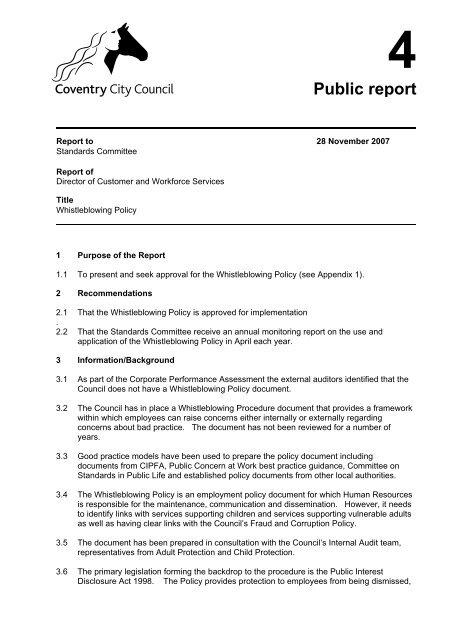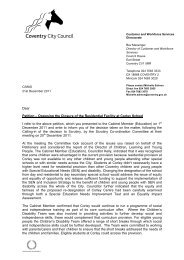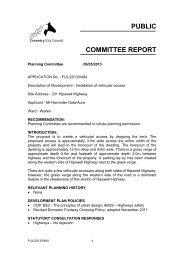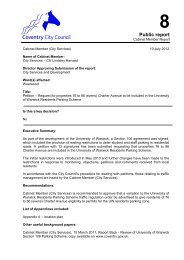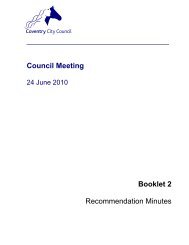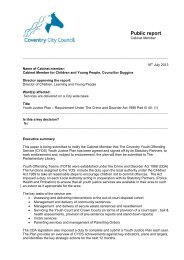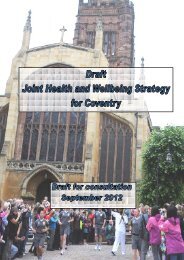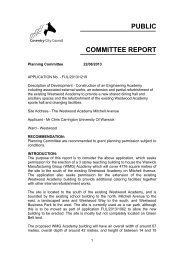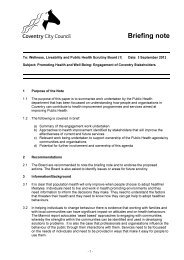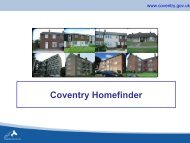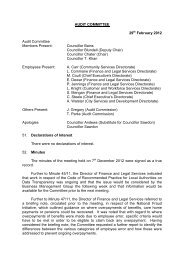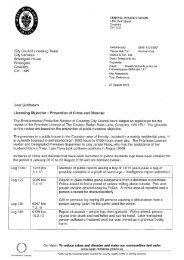Whistleblowing Policy - Coventry City Council
Whistleblowing Policy - Coventry City Council
Whistleblowing Policy - Coventry City Council
Create successful ePaper yourself
Turn your PDF publications into a flip-book with our unique Google optimized e-Paper software.
abc<br />
4<br />
Public report<br />
Report to 28 November 2007<br />
Standards Committee<br />
Report of<br />
Director of Customer and Workforce Services<br />
Title<br />
<strong>Whistleblowing</strong> <strong>Policy</strong><br />
1 Purpose of the Report<br />
1.1 To present and seek approval for the <strong>Whistleblowing</strong> <strong>Policy</strong> (see Appendix 1).<br />
2 Recommendations<br />
2.1 That the <strong>Whistleblowing</strong> <strong>Policy</strong> is approved for implementation<br />
.<br />
2.2 That the Standards Committee receive an annual monitoring report on the use and<br />
application of the <strong>Whistleblowing</strong> <strong>Policy</strong> in April each year.<br />
3 Information/Background<br />
3.1 As part of the Corporate Performance Assessment the external auditors identified that the<br />
<strong>Council</strong> does not have a <strong>Whistleblowing</strong> <strong>Policy</strong> document.<br />
3.2 The <strong>Council</strong> has in place a <strong>Whistleblowing</strong> Procedure document that provides a framework<br />
within which employees can raise concerns either internally or externally regarding<br />
concerns about bad practice. The document has not been reviewed for a number of<br />
years.<br />
3.3 Good practice models have been used to prepare the policy document including<br />
documents from CIPFA, Public Concern at Work best practice guidance, Committee on<br />
Standards in Public Life and established policy documents from other local authorities.<br />
3.4 The <strong>Whistleblowing</strong> <strong>Policy</strong> is an employment policy document for which Human Resources<br />
is responsible for the maintenance, communication and dissemination. However, it needs<br />
to identify links with services supporting children and services supporting vulnerable adults<br />
as well as having clear links with the <strong>Council</strong>’s Fraud and Corruption <strong>Policy</strong>.<br />
3.5 The document has been prepared in consultation with the <strong>Council</strong>’s Internal Audit team,<br />
representatives from Adult Protection and Child Protection.<br />
3.6 The primary legislation forming the backdrop to the procedure is the Public Interest<br />
Disclosure Act 1998. The <strong>Policy</strong> provides protection to employees from being dismissed,
or other forms of victimisation, should they choose to "blow the whistle" on bad practice<br />
within their employment.<br />
3.7 The <strong>Council</strong> cannot protect non-employees from victimisation for “blowing the whistle” on<br />
bad practice identified within the <strong>Council</strong>. However, the policy document enables<br />
Contractors working for the <strong>Council</strong> to use the provisions of this document to make the<br />
<strong>Council</strong> aware of any concerns that the contractor's employees may have with regard to<br />
contractual or other arrangements with the <strong>City</strong> <strong>Council</strong>.<br />
3.8 Revising the document provides an opportunity to relaunch/publicise the policy to<br />
employees. The policy will be available to all employees through a range of sources<br />
including the intranet, managers, Human Resources and trade union representatives. The<br />
policy will appear on the <strong>Council</strong> website to demonstrate openness and probity.<br />
3.9 The role of the Standards Committee is to monitor and review the <strong>Council</strong>'s <strong>Whistleblowing</strong><br />
Procedure. With the implementation of a revised procedure it will be appropriate to review<br />
the monitoring arrangements.<br />
4 Proposal and Other Option(s) to be considered<br />
4.1 It is proposed that the attached document (Appendix 1) replaces all previous<br />
<strong>Whistleblowing</strong> documents and the changes are fully communicated to the <strong>Council</strong>’s<br />
workforce.<br />
5 Other specific implications<br />
5.1<br />
Best Value<br />
Children and Young People<br />
Climate Change & Sustainable Development<br />
Comparable Benchmark Data<br />
Corporate Parenting<br />
<strong>Coventry</strong> Community Plan<br />
Crime and Disorder<br />
Equal Opportunities<br />
Finance<br />
Health and Safety<br />
Human Resources<br />
Human Rights Act<br />
Impact on Partner Organisations<br />
Information and Communications Technology<br />
Legal Implications<br />
Neighbourhood Management<br />
Implications<br />
(See below)<br />
<br />
<br />
<br />
<br />
<br />
No<br />
Implications<br />
2
Property Implications<br />
Race Equality Scheme<br />
Risk Management<br />
Trade Union Consultation<br />
Voluntary Sector – The <strong>Coventry</strong> Compact<br />
Implications<br />
(See below)<br />
<br />
No<br />
Implications<br />
5.2 <strong>Coventry</strong> Community Plan<br />
This policy contributes to the <strong>Coventry</strong> Community Plan vision "that each person in<br />
<strong>Coventry</strong> can experience: being healthy, keeping safe, achieving and enjoying, making a<br />
positive contribution, realising economic well-being and having supportive friends and<br />
community".<br />
5.3 Equal Opportunities<br />
The policy supports the <strong>Council</strong>'s Equalities Strategy. In particular supporting the<br />
objectives:<br />
• To create a city where people feel safe and confident and no-one is disadvantaged by<br />
the neighbourhood in which they live<br />
• To actively promote equality so that people from different backgrounds have similar life<br />
opportunities<br />
5.4 Finance<br />
The <strong>Whistleblowing</strong> <strong>Policy</strong> has clear links with the <strong>Council</strong>’s Fraud and Corruption <strong>Policy</strong> to<br />
ensure protection of the <strong>Council</strong>’s financial assets.<br />
5.5 Human Resources<br />
The policy will ensure compliance with best practice Human Resource Policies and<br />
Procedures. The policy has been developed as part of the <strong>Council</strong>'s People Management<br />
Framework.<br />
5.6 Legal Implications<br />
The document reflects the provisions of the Public Interest Disclosure Act 1998.<br />
5.7 Trade Union Consultation<br />
The recognised trade unions have been fully consulted and participated in the preparation<br />
of the document.<br />
6 Monitoring<br />
6.1 A report on the use and review of the <strong>Whistleblowing</strong> <strong>Policy</strong> will be provided to the<br />
Standards Committee as appropriate.<br />
3
7 Timescale and expected outcomes<br />
7.1 The document will be implemented as soon as possible by Human Resources in<br />
consultation with the Audit Team, the services supporting children and the services<br />
supporting vulnerable adults.<br />
Key Decision<br />
Scrutiny Consideration<br />
(if yes, which Scrutiny<br />
meeting and date)<br />
<strong>Council</strong> Consideration<br />
(if yes, date of <strong>Council</strong><br />
meeting)<br />
Yes<br />
Scrutiny Co-ordination –<br />
21 st November 2007<br />
No<br />
x<br />
x<br />
List of background papers<br />
Proper officer: Bev Messinger, Director of Customer and Workforce Services<br />
Author: Telephone 02476833277<br />
Claire Campbell, Acting HR Manager, Customer and Workforce Services<br />
(Any enquiries should be directed to the above)<br />
Other contributors:<br />
Dave Maceluch, Group Auditor, Finance and Legal Services, Tel: (024) 7683 4035<br />
Gill Carter, Senior Solicitor, Finance and Legal Services, Tel: (024) 7683 3116<br />
Colin Swann, Customer and Workforce Services, Tel: (024) 7683 3069<br />
Paul Jennings, Finance and Legal Services Tel (024) 76 83 3753<br />
Joanne Holding, HR Adviser, Customer and Workforce Services Tel: (024) 7683 3249<br />
Papers open to Public Inspection<br />
Description of paper<br />
None<br />
Location<br />
4
1. Introduction<br />
Appendix 1<br />
<strong>Whistleblowing</strong> <strong>Policy</strong><br />
October 2007<br />
1.1 The <strong>Council</strong> takes malpractice seriously and encourages people to speak out if they are<br />
aware of any actual or potential malpractice within the organisation. The <strong>Council</strong> is<br />
committed to creating an open culture, where concerns can be raised without fear of<br />
reprisals.<br />
1.2 The whistleblowing policy exists to help individuals raise concerns over any wrongdoing<br />
within <strong>Coventry</strong> <strong>City</strong> <strong>Council</strong> relating to unlawful conduct, financial malpractice, or dangers to<br />
the public or the environment. It does not apply where employees are aggrieved about their<br />
own personal position – in such instances the <strong>Council</strong>'s grievance procedure applies. (Details<br />
of this are available from the intranet or from Human Resources.) The <strong>Whistleblowing</strong> <strong>Policy</strong><br />
is primarily for concerns where the interests of others or of the organisation itself are at risk.<br />
1.3 The policy is intended to encourage and enable individuals to raise serious concerns within<br />
the <strong>Council</strong> rather than overlook a problem. The policy also outlines how individuals may<br />
properly raise concerns outside the <strong>Council</strong>.<br />
1.4 The policy supports the <strong>Council</strong>’s Fraud and Corruption policy and complements other<br />
specific investigation procedures developed to support vulnerable groups i.e. Safeguarding<br />
Children and Vulnerable Adult 1 Protection.<br />
1.5 If you have a concern, you should contact:<br />
• For fraud and financial irregularity - the Internal Audit Manager (Stephen Mangan<br />
ext 3747)<br />
• For all other matters - the Head of Legal Services as Monitoring Officer (Kathy<br />
Rice ext 3020)<br />
1 A Vulnerable adult is 'a person aged 18 years or over, who is in receipt of or may be in need of community care services by<br />
reason of 'mental or other disability, age or illness and who is or may be unable to take care of him or herself, or unable to<br />
protect him or herself against significant harm or exploitation'
1.6 All employees of the <strong>Council</strong> may use this Code. This includes permanent and temporary<br />
employees. It also covers agency workers and employees seconded to a third party. Any<br />
concerns relating to the third party, if relevant to the employee's secondment, can also be<br />
raised under this Code.<br />
Contractors working for the <strong>Council</strong> may also use the provisions of this Code to make the<br />
<strong>Council</strong> aware of any concerns that the contractor's employees may have with regard to<br />
contractual or other arrangements with the <strong>City</strong> <strong>Council</strong>. The private concerns of the<br />
contractor relating to non-council business should be raised with the relevant contractor<br />
and/or other suitable agency/regulator - including the police, if appropriate.<br />
1.7 This <strong>Policy</strong> also applies to Teachers and School employees, subject to its adoption<br />
by Governing Bodies. In Voluntary Aided schools, the Governors are the employers<br />
of the staff and not the <strong>City</strong> <strong>Council</strong>. Employees based within such establishments<br />
may wish to report concerns to the Diocesan authorities, or the external sources,<br />
referred to at paragraph 9 below.<br />
1.8 Matters reported directly to the <strong>Council</strong> by a school based <strong>Council</strong> employee will be<br />
referred to the Director of Children Learning and Young People before further action<br />
is taken. Matters reported directly to the <strong>Council</strong> by an employee of a Voluntary<br />
Aided School will be referred to the Diocesan authority by the Director of Children<br />
Learning and Young People.<br />
1.9 Details of how to raise a whistleblowing concern are given in section 4 of this document.<br />
2. <strong>Policy</strong> statement<br />
2.1 The <strong>Council</strong> is committed to the highest possible standards of openness, probity, and<br />
accountability and will take action to address improper practices. As part of this commitment,<br />
the <strong>Council</strong> is determined to follow best practice on whistleblowing and:<br />
• provide opportunities for individuals to raise concerns outside of their line management<br />
structure;<br />
• not allow any individuals who come forward with concerns raised in good faith to be<br />
discriminated against or victimised;<br />
• ensure concerns are treated in confidence and make every effort not to reveal the<br />
identity of the whistleblower. (The <strong>Council</strong> cannot give a complete assurance that an<br />
individual's identity would not be revealed – see section 6.);<br />
• investigate all concerns, ensure individuals get a response to their concerns, and take<br />
all possible action against wrongdoers;<br />
• take action against anyone found to have made a false allegation maliciously.<br />
3. When does the whistleblowing policy apply?<br />
3.1 The Public Interest Disclosure Act 1998 sets out the categories where the statutory<br />
whistleblowing protection applies. These are:<br />
• a criminal offence;<br />
• a failure to comply with a statutory or legal duty (e.g. Race Relations (Amendment) Act,<br />
Data Protection Act etc.);
• improper unauthorised use of public funds or other funds;<br />
• a miscarriage of justice;<br />
• sexual or physical abuse of any employee or service recipient;<br />
• discrimination of an employee or service recipient on the grounds of sex, age, race,<br />
disability, religion, belief or sexual orientation.<br />
• endangering of an individual's health and safety;<br />
• damage to the environment;<br />
• deliberate concealment of any of the above.<br />
3.2 In addition, the <strong>Council</strong> will provide similar protection to any employee "blowing the whistle"<br />
on any issue deemed to be a breach of the <strong>Council</strong>'s code of conduct.<br />
3.3 The overriding concern should be that it would be in the public interest for malpractice to be<br />
corrected and, if appropriate, sanctions applied.<br />
3.4 The policy is subject to any relevant legislation and specifically will operate within the<br />
requirements of the Data Protection Act.<br />
4. How to raise a concern<br />
4.1 The Public Interest Disclosure Act encourages individuals to raise their concern with their<br />
employer. Within the <strong>Council</strong>, the key contacts to raise whistleblowing concerns with are:<br />
Potential fraud or financial irregularity<br />
• Internal Audit Manager (Stephen Mangan ext 3747).<br />
Other concerns<br />
• The <strong>Council</strong>’s Monitoring Officer (the Head of Legal Services)<br />
In addition, employees can make initial contact with any of the following:<br />
• Supervisor, manager, or Head of Service<br />
• Head of Establishment or Headteacher<br />
• Trade Union representative<br />
Any of the above will provide advice on how to take the issue forward and will ensure that the<br />
relevant key contact is notified that a whistleblowing concern exists.<br />
If the concern is connected with a direct line manager/supervisor then, if appropriate, the<br />
Directorate's HR Manager will provide confidential advice as to whom the concern should be<br />
directed. Alternatively, the Internal Audit Manager or the Head of Legal Services as the<br />
<strong>Council</strong>'s Monitoring Officer should be contacted directly.<br />
4.2 Whilst individuals can raise concerns verbally, it is often better to put them in writing 2 , but any<br />
method of communication is acceptable. The information needed is the background and<br />
history of the concern giving names, dates and places where possible, and the reason for the<br />
particular concern. To allow any points raised to be clarified, individuals will need to provide<br />
details of how they can be contacted.<br />
4.3 The earlier concerns are raised; the easier it will be to take action.<br />
4.4 Advice and guidance on how matters of concern may be pursued can be obtained from the<br />
following:<br />
• Line manager, headteacher<br />
2 This can be hand written or by e-mail. If using e-mail you must consider the security and<br />
confidentiality aspects of this method.
• Human Resources<br />
• Internal Audit Services<br />
• Trade union/professional association<br />
• Public Concern at Work. This is an independent charity that operates a confidential<br />
helpline to provide free impartial advice for persons who wish to express concern about<br />
fraud and other serious malpractice. The telephone number is 020 7404 6609. Further<br />
details are available from their website – www.pcaw.co.uk.<br />
4.5 Trade Union representatives may support an employee raising an issue of concern<br />
throughout the process.<br />
5. How the <strong>Council</strong> will respond.<br />
5.1 Any concern raised either in writing or verbally under the whistleblowing policy, will be<br />
acknowledged in writing within 3 days. This will:<br />
• Acknowledge that the concern has been received;<br />
• Summarise the details of the concern;<br />
• Identify who is dealing with the matter.<br />
5.2 The action taken by the <strong>Council</strong> will depend on the nature of the concern. The matters raised<br />
may be:<br />
• investigated internally by an appropriately skilled and experienced employee,<br />
knowledgeable in the area concerned e.g. Manager, Internal Audit, Social Care<br />
Manager, Benefits Investigation Team, Human Resources, Chief Executive, the<br />
<strong>Council</strong>’s Monitoring Officer, Vulnerable Adults Protection Coordinator, the<br />
Safeguarding Children Officer etc;<br />
• referred to the Police;<br />
• referred to the External Auditor or Ombudsman;<br />
• referred to the National Standards Board;<br />
• the subject of an independent enquiry.<br />
5.3 In order to protect individuals and the <strong>Council</strong>, initial enquiries will be made to decide whether<br />
an investigation is appropriate and, if so, what form it should take. Concerns or allegations<br />
that fall within the scope of specific procedures (for example, safeguarding children,<br />
vulnerable adults’ protection, or discrimination issues) will normally be referred for<br />
consideration under those procedures.<br />
5.4 Some concerns may be resolved by agreed action without the need for further investigation.<br />
5.5 The amount of contact between the officer(s) considering the issues and the employee<br />
reporting the concern will depend on the nature of the matters raised, the potential difficulties<br />
involved and the clarity of the information provided. If necessary, further information will be<br />
obtained from the individual reporting the concern in a discreet manner.<br />
5.6 When any meeting is arranged, individuals will have the right, if desired, to be accompanied<br />
by a trade union or other representative. The meeting can be arranged away from the<br />
normal place of work, if requested.<br />
5.7 The <strong>Council</strong> will take steps to minimise any difficulties which individuals may experience as a<br />
result of raising a concern and provide any appropriate support. For instance, if the<br />
individual is required to give evidence in disciplinary or criminal proceedings, the <strong>Council</strong> will<br />
provide advice about the procedure.<br />
5.8 The <strong>Council</strong> accepts that individuals raising a concern need to be assured that the matter<br />
has been properly addressed and will notify them when the whistleblowing policy process<br />
has been completed. This will normally be within 20 working days of a concern being raised.<br />
In addition, details will be given on what action has been taken to correct working practices,<br />
which have been found to be at fault by the investigation.
5.9 If an allegation is received anonymously, it may restrict what the <strong>Council</strong> is able to do.<br />
There is an expectation that the person reporting a matter will disclose their identity<br />
to the Audit Manager, as this will facilitate the investigation. The <strong>Council</strong> will<br />
endeavour to maintain the person’s anonymity wherever possible.<br />
5.10 The following factors will be considered when establishing the scope and depth of any<br />
investigation:<br />
• The seriousness of the issues raised;<br />
• The credibility of the concern; and<br />
• The likelihood of confirming the allegation from recognised sources and information<br />
available.<br />
6. Safeguards<br />
6.1 The <strong>Council</strong> recognises that the decision to report a concern can be a difficult one to make,<br />
not least because of the fear of reprisal from those responsible for the alleged malpractice.<br />
The <strong>Council</strong> will not tolerate harassment or victimisation and will take action to protect<br />
individuals wherever possible provided that:<br />
• The concerns are raised in good faith;<br />
• The information provided is believed to be true, even if the allegation is not<br />
subsequently confirmed by the investigation;<br />
• Allegations are not made for personal gain.<br />
The Internal Audit Manager or the monitoring officer will carry out a risk assessment to<br />
determine safeguards as necessary.<br />
6.2 Every effort will be made to ensure confidentiality as far as is reasonably practical.<br />
Individuals should be aware that actions taken as a result of their report may lead to their<br />
identity being revealed, either by inference or as a result of disciplinary or legal proceedings.<br />
If this should happen, the <strong>Council</strong> would seek to ensure that the individual is not victimised in<br />
any way.<br />
6.3 Support will be provided to help overcome any difficulties experienced as a result of raising a<br />
concern. During the investigation, any meetings with the individual raising the concern can be<br />
arranged away from their place of work and they will have the opportunity to be accompanied<br />
by a representative of their choice, if they wish. If the individual is required to present<br />
evidence as a witness, arrangements will be made to provide them with support through the<br />
process. Access to counselling and support is available to all employees.<br />
6.4 Every effort will be made to keep the individual reporting the matter of concern informed.<br />
However, the information provided will be determined by the nature of the investigation and<br />
whilst safeguarding the rights of other individuals involved in the process.<br />
7. Malicious Allegations<br />
7.1 The <strong>Council</strong> will take action against any individual found to have made a malicious or<br />
vexatious allegation. For an employee, this could result in disciplinary proceedings.<br />
8. Raising concerns outside of the <strong>Council</strong>.<br />
8.1 This policy is intended to provide employees with an avenue to raise concerns within the<br />
<strong>Council</strong>. If an employee instead takes the matter outside the <strong>Council</strong>, they should ensure<br />
that they do not disclose confidential information. Employees should also check that they do<br />
not contravene the Public Interest Disclosure Act as this does not provide blanket protection
and only allows individuals to disclose matters to their employer or specified bodies. Any<br />
breach of the Act could lead to disciplinary action.<br />
8.2 If an individual wishes to raise a concern outside the council or feels that the <strong>Council</strong> has not<br />
handled their concern appropriately, the following possible contact points may be relevant –<br />
• The Ombudsman – 0845 602 1983 (www.lgo.org.uk)<br />
• The Audit Commission. 0844 7981212 www.audit-commission.gov.uk<br />
• Relevant professional bodies or regulatory organisations<br />
• Trade Union/Professional Association – details are available from Human<br />
Resources<br />
• Your solicitor<br />
• The Police<br />
9 Monitoring<br />
9.1 Monitoring of the <strong>Whistleblowing</strong> Procedure will be undertaken by the <strong>Council</strong>'s Standards<br />
Committee in accordance with the Constitution.


